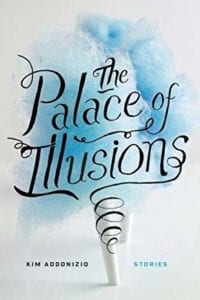
shelfunbound What’s a typical starting point for you in writing a story, for example the troubled little Annabelle with a neglectful mother and a lecherous grandfather in this book’s first story?
kimaddonizio I often just start with an image that sticks in my head; in this case it was a little girl and a goldfish. Honestly, I don’t know where that came from. And I never know where a story is going. I feel my way along, asking questions: who is this character? What’s her life like? In the case of “Beautiful Lady of the Snow,” a lot of things changed in revision. The grandfather, for example, started out as a grandmother. I based her loosely on my aunt, who had been a large, clumsy woman. The significant changes came about when I began not just to describe my main character, little Annabelle, but to see the world from her point of view. Then I realized she must have a reason for this odd and kind of awful thing of having her pets die under her care. It’s as though I had to uncover her real story, what made her tick. I have to stop willfully writing the characters at some point. Nabokov said his characters were his “galley slaves,” but the point of greatest excitement, for me, is when they revolt and break their shackles.
shelfunbound
How do you develop your characters, such as the woman following a blog chronicling her ex-husband’s recovery from a bike accident in “In the Time of the Byzantine Empire”?
kimaddonizio This one was somewhat autobiographical, in that my ex-husband did have a very serious bike accident he was lucky to survive. Writing that story was a way for me to work through some of my own grief over his situation. I still had to find the story, though, and that meant the woman wasn’t me, but a character in a similar situation. My daughter was upset by that story because she felt it represented my true feelings. What I did was take a very fleeting, passing emotion and amplify it so that it seemed the central character’s main concern. It’s like having a bad day and feeling a little blue, then writing a story about suicide. You’re not even close to wanting to kill yourself, but a mood may give you a little glimpse, and you work with that to discover more.
shelfunbound Do you have a favorite story in this book, and if so which one and why?
kimaddonizio “Cancer Poems” was written in large part to honor a student and friend of mine who died. When she was dying, I read her the poetry of Jack Gilbert. I also wanted to explore what poetry can mean in the face of death. I loved inventing the teacher, Lily Yee, and exploring the dynamics of a poetry workshop. It’s both absurd and moving, what can happen in these classes.
shelfunbound
How do you find the entry point for your short stories, such as the first line of “Blown”: “You’re having breakfast with a boy you slept with last night but don’t know very well.”
kimaddonizio I think that started with wanting to write about the weird glassware in that diner—drinking tea out of naked women’s bodies! Sometimes there’s one little thing you just have to describe, and you build an entire story around that. Also, I try for first lines that can create a lot of tension right away. The story “Ice” begins with an actual dream I had, and I knew it would make a good opening: “Last night I dreamed I killed my brother. With an ax.” As a reader, I confess I like instant gratification. If a first paragraph doesn’t grab me, I move on. So I try to write openings that will do the same to readers—make them curious or uncomfortable, and lure them in to the world of the story.
shelfunbound
A short story is like
kimaddonizio …getting lost in a dark woods where demons and fairies lurk and stones may turn into bread, or vice-versa. At the end there is a small shaft of light through a break in the leaf canopy. Possibly you’re still lost.
shelfunbound What is the appeal for you of writing short stories?
kimaddonizio There’s great freedom, for me, in fiction. I write non-fiction as well—I have a memoir, Bukowski in a Sundress, coming out next year—and it can feel limiting having only myself and my experience to write about. The short story is an opportunity not only to invent, but also to get quickly to the heart of the matter, find something meaningful there, and move on.
shelfunbound If you were teaching a course on short story writing, what is the primary piece of advice you would offer?
kimaddonizio If it’s just one piece of advice, like one piece of pie, it would consist of at least two ingredients: honesty and ruthlessness. Honesty in that you have to confront the truth of the subject and not write around it—the only way out is through. Ruthlessness: be willing to destroy what you’ve done and recreate it from the ground up, if need be. Ice cream with that?
shelfunbound
What’s a favorite book you read in 2014?
kimaddonizio
Jo Ann Beard’s The Boys of My Youth, which I just discovered—gorgeous essays that read like short stories. And if I can have a second, I also loved poet Sarah Manguso’s memoir of her autoimmune disorder, The Two Kinds of Decay.
shelfunbound Any books you’re particularly looking forward to in 2015?
kimaddonizio Charles D’Ambrosio’s Loitering: New and Selected Essays, is just out and I’m dying to read it. I fell in love with him as a short story writer, and never realized he wrote essays. I’m still working on some essays of my own; when it’s time for a change I’ll go back to reading, and writing in, other forms.
